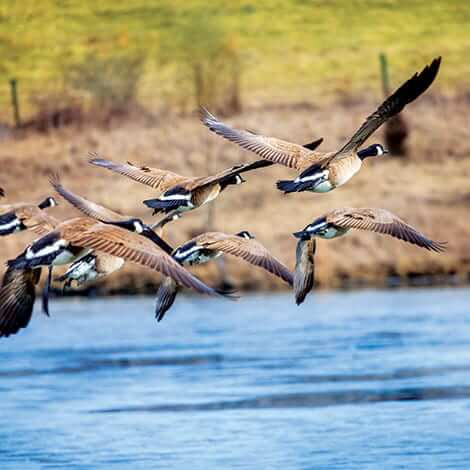Having an open body of water like a pond in the backyard is great for drawing wildlife, but not all wildlife are welcomed. In the spring, you may begin to notice a gathering of geese around your pond. Many pond owners dislike geese because they add nutrients to the pond and unsightly mess along the shoreline.
Identification
The most common geese that pond owners face are Canada Geese. These waterfowl inhabit just about any type of water body from lakes, rivers, and ponds to any area where water is present. Canada Geese have a black head and neck and white cheeks. Their bodies are brown with a tan chest and are famous for their flocks flying in the V-shaped formation.
Challenges of Having Geese
If you have ever been to a park that is frequented by geese you will notice that they tend to cover the entire ground with droppings. This abundance of waste is less than ideal for those of you that swim in your pond. The additional influx of organic waste can also cloud your water and promote increased weed and algae growth.
Geese can also carry problematic items from neighboring ponds. Duckweed and leeches commonly hitch a ride on the feet of water foul like geese and ducks, which are then introduced into your pond as they loiter in your yard.
Whether or not you should let geese use your pond depends on what you want to use your pond for. If you use your pond for recreation or decorative purposes it will be in your best interest to keep them away. If your pond exists for reasons outside of recreation and you enjoy the additional sights and sounds of geese in the summer then rest assured that your feathered friends would be relieved to see your decoy free pond.
What You Can Do to Deter Them
The best way to keep that mess off your lawn and pond is to prevent geese from stopping in the first place! One of the best ways to do that is to put up a replica of a predator that the geese can see from the sky before it ever becomes close to landing in your property and calling it home. Just make sure where ever you put the decoy the geese will be able to see if from above.
- Swan Decoy: Swans and geese make similar nesting areas, but they do not flock together. In fact, swans are quite territorial and aggressive toward geese—especially when there are baby swans in the mix. So when geese see a swan decoy, like the Floating Swan Decoy, they will fly on by to find a lake or pond that's not inhabited by their grumpy cousins.
- Alligator Decoy: Whether your pond is in Florida, Wisconsin or Oregon, your resident geese will scatter when an alligator decoy, like the Gator Guard Decoy, is deployed. Geese instinctively fear alligators, even if they have never seen one before.
- Coyote Decoy: Geese (and just about every other critter) do not like coyotes. The 3D Coyote Decoy looks lifelike from all angles, particularly when the wind blows and moves its tail and body. Geese will spot this movement from a great distance and steer clear of it. Nesting birds and other rodents will not want to seek refuge anywhere near your property if they spot this lurking predator in the open!
When using decoys to deter geese, don't forget to move them around every few days. If you leave them in the same spot, the geese will realize it's a fake and move in.
Other Tips
- Plant More Vegetation: Geese prefer open spaces so they can look out for predators, so you can take that away by getting more plants and bushes in your property.
- Do Not Feed Them: If you feed them once ,they will keep coming back.
- Employ the Canine: If all else fails, canines, like boarder collies, have been very effective at scaring away-unwanted guests.
Last Updated: February 1, 2023
